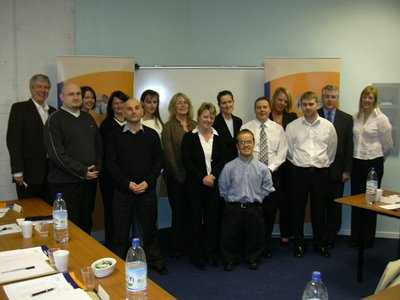
This article by charitytraining.com director, Tony Gibbs, was published in the Spring 2006 edition of Charities Management magazine.
You can either post your feedback to the points raised in this article here, or email
tony@charitytraining.com with your views.
Ask any board of trustees to rank in order of priority the most important strategic issues facing their organisation over the next three years and the chances are that sustainability will feature prominently – sustainable funding, sustainable service delivery, sustainable contracts, sustainable governance and management… yet, for many organisations, sustainability at any level, is in most cases directly (or indirectly) influenced by external factors.
A recent snapshot reveals a number of external drivers that are contributing to a rapidly changing environment that trustees at least have to acknowledge, if not build in to their strategic plans – for example, will the new Charities Bill have any impact on the organisation? Have we reviewed our financial monitoring and evaluation processes to take into account SORP 2005? If reliant on contract income, have we engaged with government initiatives such as Local Area Agreements?
The list of government and sector led initiatives goes on – Futurebuilders, the civil renewal agenda, the Compact, Change Up, and then there’s the hubs; the Leadership Hub, Workforce Hub, IT Hub and so on. A trustee could be forgiven for asking just who is in the driving seat? Is it our board of trustees or other stakeholders, regulators, funders, or central government?
When considering sustainability, inevitably thoughts turn to financial sustainability, and one area of government initiatives in particular is worthy of discussion by many trustee boards – to what extent does the voluntary sector now need to engage with public service delivery initiatives in order to achieve a sustainable future?
According to the Under Secretary of State, Paul Goggins, who addressed the acevo conference in June 2005, he announced that his task was to ensure that ‘government policy supports the voluntary sector in achieving it’s full potential: as a voice for people at the edge of our society, as an inspiration for new ideas, and as a provider of mainstream services.’ Interestingly, Mr Goggins’ conference presentation was followed by a Treasury backed cross-cutting review of the voluntary and community sector in service delivery in September 2005.
The key recommendations of this review were –
1. To involve the Voluntary and Community Sector in planning as well as delivery of public services
2. To forge long term strategic partnerships with the sector
3. To build capacity of the sector
4. To get funding relationships right including issues such as full cost recovery
5. To implement the Compact at all levels
Clearly government is keen to support the Voluntary and Community Sector, and through Change Up, has publicly stated that ‘by 2014, the Voluntary and Community Sector infrastructure available nationwide will be structured for maximum efficiency, offering excellent provision, accessibility to all, while reflecting and promoting diversity, and is sustainabily funded.’
In making statements like this, central government acknowledges the importance of sustainability, but from the perspective of many charities, especially the smaller ones, how does this play out when preparing their strategic plans?
Do those charities involved in public service delivery, fully appreciate the importance of trends that could have a direct impact on their funding and services over the next few years? Is there any truth in the perception (voiced at a recent Voluntary and Community Sector conference in Essex) that central government comes up with good ideas, but then expects the Voluntary and Community Sector to deliver?
As part of it’s Public Service Delivery agenda, central government has identified four key strands in support of what have been dubbed Local Area Agreements. Those strands are Safer Stronger Communities, Children and Young People, Healthy Communities and Older People, and Economic Development and Enterprise.
For most charities, these initiatives create lots of opportunities for charities to be involved in the local delivery of public services (subject to successfully tendering for contracts), but without partnerships (with other organisations) the process of tendering for contracts and grants may in itself be difficult or impossible to realise – especially for those smaller organisations whose focus to date has been on beneficiary support, maybe to the detriment of developing more ‘business-like’ processes and behaviours.
There is no doubt that all organisations increasingly need to recognise the significance of becoming more business-like, and if your organisation is reliant on public service delivery contracts, then might it be just possible that the sustainability of your services is being driven by others, in particular central government? Failure to equip yourselves to engage with these issues, and in particular to develop the necessary competencies required to successfully build partnerships and win contracts, may ultimately prove to be the biggest issues that some trustees need to address when thinking about sustainability.
When looking at broader sustainability issues, inevitably attention homes in on sustainable funding, and with this is the recognition that there is a shift from a reliance on voluntary giving and grants, to a greater emphasis on a contract culture, income generation, and service level agreements – whether in support of public service delivery contracts or not.
With many organisations dependent on short term project funding, there are inevitable limitations when considering sustainability beyond the life of the project (or contract) funding cycle. According to NCVO, this is leading to a move towards a social enterprise economy with organisations developing skills to support trading activities that enable them to reconnect with beneficiaries, and seeking to develop sustainable income streams that support genuinely independent planning. In other words, what can the organisation do to take control of its own destiny and prepare plans that will lead to a sustainable future of its own making rather than having to respond to what others are doing?
It is estimated that the Voluntary and Community Sector has over 500,000 paid employees, creates relationships with over 3 million volunteers, and has income in excess of £20 billion (source: NCVO September 2005).
But against the backdrop of public service reform – largely driven by central government - what does this mean for the independence of the sector? It means that Voluntary and Community Organisations need to embrace change, and quickly: changes in accountability, changes in funding, and changes in the skills required to remain in public service delivery, developing the skills that support a more ‘business-like’ management approach that will enable the organisation to win and deliver contracts.
But what about those organisations not involved in public service delivery? Where will their funding come from? Will we see more organisations suffering from ‘mission drift’ simply to secure contract funding? Might smaller charities continue to be vulnerable if reliant on just one or two contracts? Whether the future is linked to public service delivery or not, sustainability and in particular sustainable income streams, will only be achieved by those organisations with the skills and competencies to engage with what is an ever changing and complex environment.
Fundamentally, sustainable organisations will be those who fully understand their costs in order to set contract prices that enable full cost recovery. Without this basic understanding of costing to pricing models, many organisations will never be capable of achieving a sustainable position.
There is already a need for improved skills in contract negotiation and the management and monitoring of service contracts. There is greater emphasis than ever before on the need for organisations of all sizes to develop the governance, leadership and management skills and competences required to develop and maintain sustainable plans.
Sustainability will not happen as a result of past successes. Sustainability can only be achieved be responding to the wider environment and in so doing, taking stock of the skills already within the organisation, those new skills required, and in turn meeting the skills gaps that will inevitably make a difference.
Training and development budgets are often those most readily targeted for cuts when the annual budget planning cycle starts – ironically, our sector is at a stage in its development when this is the very time when many organisations need to invest more than ever before to support the development of individuals within the organisation that will lead to a sustainable future.
If your organisation has yet to agree it’s training and development plans for the year ahead, maybe this is a good time to start.

 This article by charitytraining.com director, Tony Gibbs, was published in the Spring 2006 edition of Charities Management magazine.
This article by charitytraining.com director, Tony Gibbs, was published in the Spring 2006 edition of Charities Management magazine. The use of Neuro-Linguistic Programming (NLP) is a powerful approach that will help you in four essential areas in how you communicate, motivate, and manage others (and yourself) in your work - as well as being of invaluable help to you in your personal life.
The use of Neuro-Linguistic Programming (NLP) is a powerful approach that will help you in four essential areas in how you communicate, motivate, and manage others (and yourself) in your work - as well as being of invaluable help to you in your personal life. If you're studying for a qualification, or just need to kick start your day, have you ever thought about how the music in your life can make a difference?
If you're studying for a qualification, or just need to kick start your day, have you ever thought about how the music in your life can make a difference? At our recent Super Saturday for BTEC distance learners, we were fortunate to have Peter Grant from Cass Business School present a grant-making Masterclass. Among the many highlights of Peter's lecture were the references he made to a book which can be downloaded free of charge that examines a number of issues facing the grant-making economy.
At our recent Super Saturday for BTEC distance learners, we were fortunate to have Peter Grant from Cass Business School present a grant-making Masterclass. Among the many highlights of Peter's lecture were the references he made to a book which can be downloaded free of charge that examines a number of issues facing the grant-making economy. Looking back at last week there was a common theme emerging from two workshops we ran for our BTEC learners - the use of technology within the voluntary sector.
Looking back at last week there was a common theme emerging from two workshops we ran for our BTEC learners - the use of technology within the voluntary sector. BTEC Professional Certificate in Voluntary Sector Management launched in UK to support the personal development needs of charity managers and trustees throughout Europe.
BTEC Professional Certificate in Voluntary Sector Management launched in UK to support the personal development needs of charity managers and trustees throughout Europe. charitytraining.com is a trading style of Volsector Limited, established as an online information resource for charity managers by Tony Gibbs in 1999. Volsector publishes a range of charity management books and workbooks including 'How to make it as a charity manager' and the workbooks which support learners in their studies for the BTEC Professional Certificate in Voluntary Sector Management.
charitytraining.com is a trading style of Volsector Limited, established as an online information resource for charity managers by Tony Gibbs in 1999. Volsector publishes a range of charity management books and workbooks including 'How to make it as a charity manager' and the workbooks which support learners in their studies for the BTEC Professional Certificate in Voluntary Sector Management.
